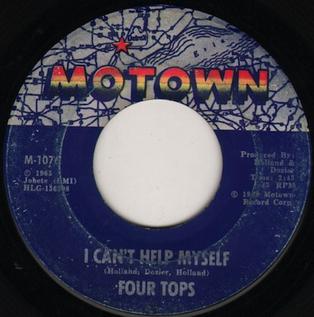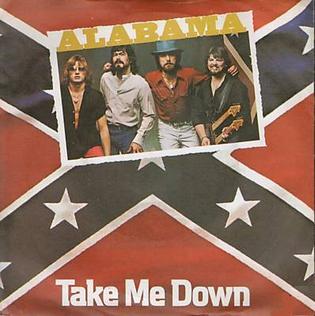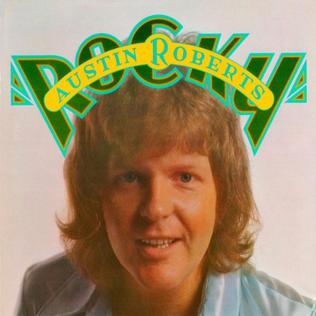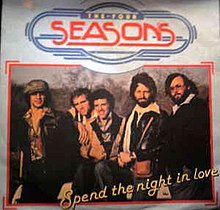
The Four Seasons are an American rock band that became internationally successful in the 1960s and 1970s. Since 1970, they have also been known at times as Frankie Valli and the Four Seasons. In 1960, the band known as the Four Lovers evolved into the Four Seasons, with Frankie Valli as the lead singer, Bob Gaudio on keyboards and tenor vocals, Tommy DeVito on lead guitar and baritone vocals, and Nick Massi on electric bass and bass vocals. On nearly all of their 1960s hits they were credited as the 4 Seasons.

"I Can't Help Myself " is a 1965 hit song recorded by the Four Tops for the Motown label.

"December, 1963 " is a song originally performed by The Four Seasons, written by original Four Seasons keyboard player Bob Gaudio and his future wife Judy Parker, produced by Gaudio, and included on the group's album, Who Loves You (1975).

"Bye, Bye, Baby " is a popular song written by Bob Crewe and Bob Gaudio, a member of The Four Seasons, whose version of the song made it to No. 1 in Canada and No. 12 on the US Billboard Hot 100 in 1965. On the original issue of the single, the title was "Bye Bye Baby"; on the album The 4 Seasons Entertain You, the name was changed to the longer, more familiar name. The song is about saying goodbye, not because the person is unloved but rather because the relationship is adulterous.

"Big Girls Don't Cry" is a song written by Bob Crewe and Bob Gaudio and originally recorded by The Four Seasons. It hit number one on the Billboard Hot 100 on November 17, 1962, and, like its predecessor "Sherry", spent five weeks in the top position but never ranked in the Billboard year-end charts of 1962 or 1963. The song also made it to number one, for three weeks, on Billboard's Rhythm and Blues survey. It was also the quartet's second single to make it to number one on the US R&B charts.

"Sherry" is a song written by Bob Gaudio and recorded by The Four Seasons.

"Urgent" is a song by the British-American rock band Foreigner, and the first single from their album 4 in 1981.

"Rag Doll" is a popular song written by Bob Crewe and Bob Gaudio. It was recorded by the Four Seasons and released as a single in 1964. It reached number one on the Billboard Hot 100 on July 18, 1964, and remained on top for two weeks. The song was also a number one hit in Canada, and reached number two in the UK and number four in Ireland.
The Four Lovers was a band formed in 1956 that was the result of vocalist Frankie Valli joining The Variatones in 1954. The Four Lovers' achieved minor success before a name change to The Four Seasons in 1960. During those five years, group members also included Nicolas DeVito, Hugh Garrity, Charles Calello (bass), Nick Massi, Bob Gaudio, and Philip Mongiovi (drums)
The Wonder Who? was a nom de disque of The Four Seasons for four single records released from 1965 to 1967. It was one of a handful of "names" used by the group at that time, including Frankie Valli and The Valli Boys. Wonder Who? recordings generally feature the falsetto singing by Valli, but with a softer falsetto than on "typical" Four Seasons recordings.

"It's My Turn" is a 1980 song used as the theme to the film of the same name. The song, written by Carole Bayer Sager (lyrics) and Michael Masser (music) for Diana Ross, was released as the film's soundtrack single on September 29, 1980, by Motown. It became a top ten hit on the Billboard Hot 100, peaking at number nine, and at number 14 on the soul chart. "It's My Turn", likewise, peaked at number nine on the Adult Contemporary chart. The song was used as the theme song of Philippine drama anthology Coney Reyes on Camera in 1984.

"Who Loves You" is the title song of a 1975 album by The Four Seasons. It was composed by Bob Gaudio and Judy Parker and produced by Gaudio. It reached number 3 on the Billboard Hot 100 in November 1975.

"Silver Star" is the lead song on the Four Seasons album Who Loves You. As was the case of all the songs on the LP, it was written by Bob Gaudio and Judy Parker and produced by Gaudio. Drummer Gerry Polci sang lead. Frankie Valli's contribution was limited to harmony vocals, since he was gradually losing his hearing in the 1970s due to otosclerosis. An operation restored most of Valli's hearing in the 1980s.

"Drivin' My Life Away" is a song co-written and recorded by American country music artist Eddie Rabbitt. The song was written by Rabbitt, Even Stevens and David Malloy.

"Take Me Down" is a song recorded by American country music band Alabama. It was released in May 1982 as the second single from Alabama's album Mountain Music.

"If You Love Me " is a song written by John Rostill that was a 1974 hit single for Olivia Newton-John. It was her second release to hit the top 10 in the United States, reaching number 5 on the pop chart and number 2 on the Easy Listening chart. It also reached number 2 on the Billboard country chart. As with her single "Let Me Be There", Mike Sammes sings a bass harmony.

"A World of Our Own" is a 1965 single written by Tom Springfield and was an international hit for the Seekers. The single peaked at number 19 on the Hot 100 and number 2 on the Easy Listening charts.

"Rocky" is a song written by Ronald Johnson and performed by American country music artist Dickey Lee. It was released in July 1975 as the fifth single and title track from the album Rocky. On the country chart, "Rocky" was Lee's most successful single, and his only number one. It spent fourteen weeks on the chart, including one week at number one.
"I Love You Because" is a song written and recorded by country music singer and songwriter Leon Payne in 1949. The song has been covered by several artists throughout the years, including hit cover versions by Al Martino in 1963 and Jim Reeves in 1964.

"To the Door of the Sun " is a 1974 hit single by Al Martino. It was the title track of his LP. A concurrently released version by Gigliola Cinquetti became a hit in South Africa (#6).
















